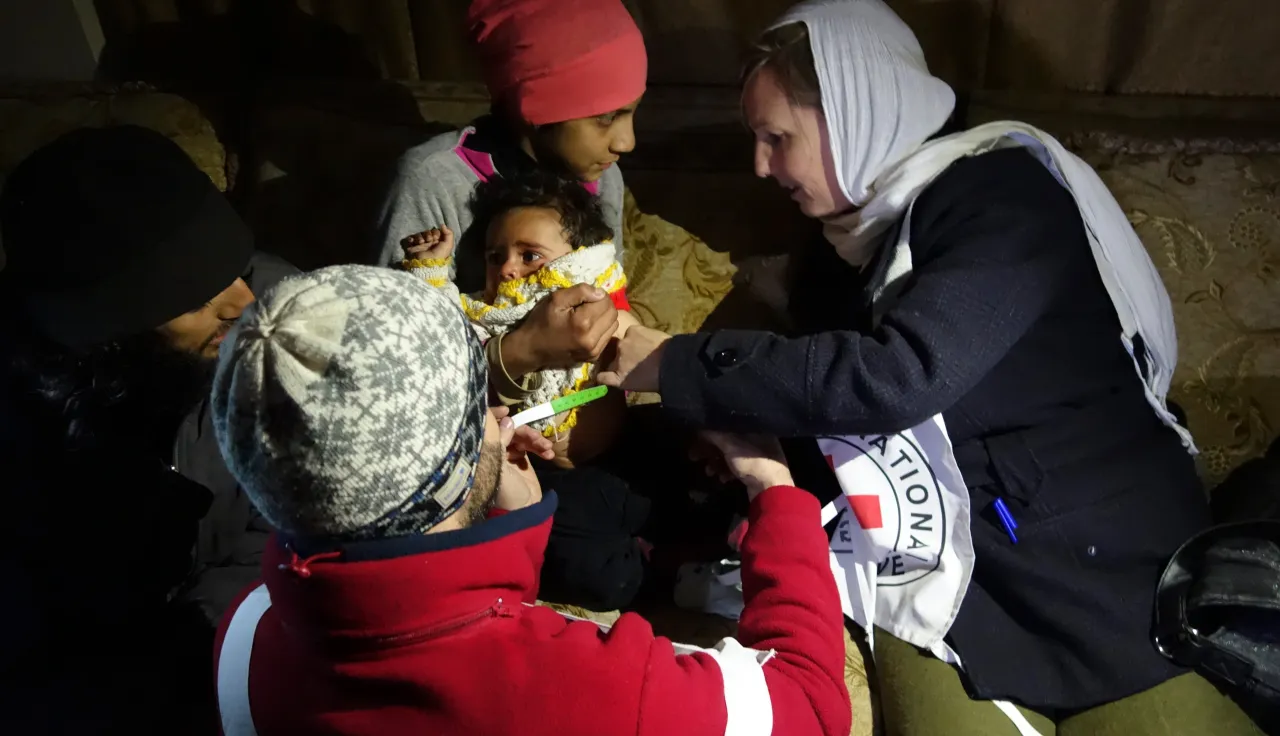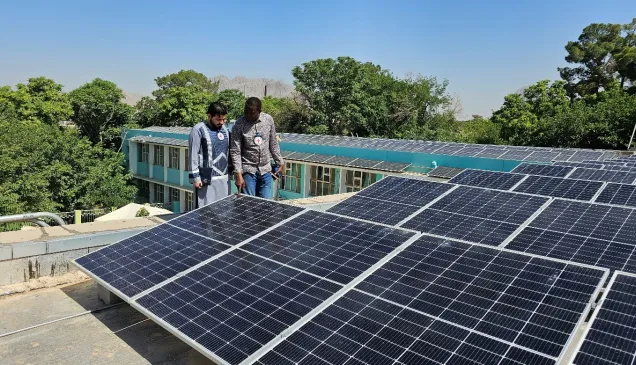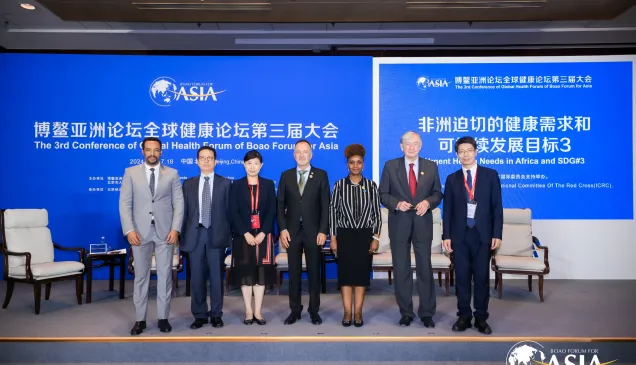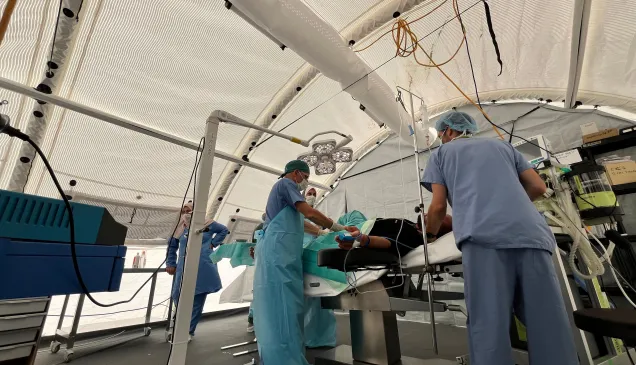World Humanitarian Day 2022: Faces of courage

Humanitarian workers often work in the world’s most challenging environments to reach people who need help.
At the ICRC, we do this while exercising impartiality and neutrality. Neutrality means not taking sides in hostilities or engaging at any time in controversies of a political, racial, religious, or ideological nature. Impartiality, on the other hand, means making no discrimination as to nationality, race, religious beliefs, class, or political opinions. These principles are not always easy to apply, but the ICRC aid workers strive to do so with every action they take in helping those in need.
World Humanitarian Day, on August 19, honours those who put themselves in harm's way to protect and save the lives of people in dire need due to natural disasters, active conflicts, and other humanitarian crises. We spoke to a few of our ICRC and Red Cross colleagues about what it means to be a humanitarian worker.
Manuel Sáenz Terrazas

Being a humanitarian worker means having the opportunity to do something when no one else is doing it.
Manuel Sáenz Terrazas is a senior surgeon based at the Maiduguri State Specialist Hospital, in Nigeria, where he treats patients who have suffered serious injuries from firearms and explosives. He has worked for the ICRC for seven years. Most of the patients come to the hospital hours, days, weeks and sometimes years after they were injured, which speaks to the lack of options in conflict zones, apart from the aid offered by the ICRC.
"Working for the ICRC gives me the opportunity to reach people who would otherwise be unreachable. Sometimes people come to us not only because we are the last resort, but because we are the only one," he said.
Jacob Chonge

As a radio operator, I know that it takes a matter of minutes to save a life sometimes. Knowing that I am a lifeline for the people we serve makes me convinced that this is not just any other job. The cause we serve is much bigger than that.
Jacob Chonge is a Radio Operator Supervisor for the Horn of Africa. He's been with the ICRC for 21 years and supports global operations as a trainer.
Radio operators are the voices behind the movement of staff in the field. They give advice on which routes are safe to travel and manage Red Cross flights. Because of the remoteness of the places where the ICRC works, radio communication becomes the only reliable means of communication.
"I draw a lot of inspiration and satisfaction from the knowledge that, as humanitarian workers, we serve fellow human beings who we may never meet or never see. We touch their lives through our work."
Anastasiia Mykhailova

Right here and right now, I can help some children access education again. Millions of them have been out of school due to the conflict.
Anastasiia Mykhailova is the Access to Education field officer and is based in Kyiv, Ukraine.
Anastasiia is from Luhansk and lived in Severodonestk until February 2022, when she started working for the ICRC. She helps children and teachers affected by the conflict in Ukraine and supports the restoration of educational facilities that have been damaged.
"After many years of teaching in schools and colleges, I understand how important education is, especially during these current hostilities in Ukraine. Access to education is a right that every child should have, and being involved in supporting this, especially for those in need, is what makes my work here so special."
Karen Lieve Ria Hostens

What we need to remember in our daily work is that we are all here to serve people affected by vulnerabilities; they are not vulnerable per se.
Karen Lieve Ria Hostens is a deputy regional director in Africa. She's based in Kenya. Karen's work as a humanitarian worker was shaped by her own family's experiences in both World Wars in Belgium. This background, and her childhood moving between many countries, inspired her worldview and strengthened her resolve to understand humanity in a neutral, impartial, and independent way. This led her to academia and eventually to the humanitarian sector, always working within the Red Cross / Red Crescent Movement.
As a people manager, the most important principle she lives with is the duty of care.
"Duty of care is not about publishing a policy on mental health on the intranet or doing an appraisal, or even giving a salary increase or extra days off. It is about seeing our colleagues, taking time to recognise them, and check in to see if they are alright. It is a responsibility not to be taken lightly."
Verena Johanna Kreiliger Young

Being a humanitarian worker is about making a difference in people's lives in any way that I can.
Verena Johanna Kreiliger Young is a physiotherapy team leader based in Juba, South Sudan. She has worked for the ICRC since 2019 in both hospitals and rehabilitation centres in Yemen and Afghanistan before joining her current workstation.
"The experience of working in both hospitals and rehabilitation centres gave me a front-row view of the patients' journey from the time they were injured to the recovery process. This made me see the difference we make in people's lives."
Verena is grateful that her team members support her with translations.
For her, the most rewarding thing about her job is the joint effort put by team members in making a substantial difference to people's lives.
"It's not a single person that makes a difference, it's all of us in the team."
Diana Zakharyan

I feel motivated when we help someone who everyone has turned their back on.
Diana Zakharyan, 24, works for the Russian Red Cross (RRC) in Ulyanovsk, Russia. She deals with communication, supply and maintenance. She graduated from the Ulyanovsk Pedagogical University with a degree in geography. She came to the RRC as a volunteer three years ago. She oversees of more than 30 health points for senior citizens and people with disabilities. Furthermore, she helps to encourage young people to become RRC volunteers. She remains an ambassador of RRC when on duty and off duty.
"People come with their stories; and they are not always positive. The most important thing is the ability to filter all this and competently help people in need."
Paul Okony Apok

To be a humanitarian worker means to be ready at any time when called upon to support an affected community or group. Our uniqueness at the ICRC is that we don't take sides and we don't discriminate.
Paul Okony Apok works in the economic security department as a field officer in Juba, South Sudan. He has been a humanitarian worker for two decades.
His work involves assessing the needs of the affected communities that the ICRC serves. Depending on the findings, he makes recommendations about food distribution, cash assistance or provision of fishing kits.
One of the biggest challenges he faces in his line of work is accessibility to the communities we serve, especially during the rainy season when the roads become impassable, and they are forced to fly. The security situation can also become challenging because "you don't know who controls where".
Ami Basendo

Bringing joy to families dispersed by violence and armed conflict is my deepest motivation. I feel proud and useful every time a child is reunited with parents or relatives who accept and integrate them after a separation.
Ami Basendo has been working with the ICRC for 11 years in the Democratic Republic of the Congo (DRC). He's currently working in Kinshasa, helping children separated from their families, unaccompanied, or those released from armed forces or groups. He follows the entire process of restoring family ties until the children are reunited with their loved ones.
One of the incidents that shaped his career was a family reunion with a teenager from the Central African Republic who had fled to the DRC for six years after violent clashes in his community.
"On the day of the family reunion, when I saw the immense joy of his aunt and other family members to find him when they thought he was dead, I understood the importance of my humanitarian work."
Santos Beni

As a driver, it's important for me to remain neutral in my work, by not taking part in controversy or hostilities, so that I can safely bring aid to those who need it the most.
Santos Beni works for the ICRC in Mozambique as a driver. He faces many challenges as he brings aid to people who live in areas that are difficult to reach by car. Getting there takes about 20 days. Santos transports health professionals, COVID-19 vaccines, and Mozambique Red Cross (CVM) volunteers.
"Working for the ICRC allows me to reach people that would otherwise be impossible to reach. This is because we work without taking sides, and our only criteria for helping is that the people are in need."
Tabot Louis Awah

Humanitarian work has taught me to serve humanity empathetically.
Tabot Louis Awah is a water and habitat engineer based in Cameroon. Working with the ICRC has pushed him to serve humanity "better and with much empathy".
"My role is to relieve suffering through active engineering assistance. It reflects my true values in life. It makes me feel that the knowledge and skills I acquired in school are used in the right way and that's fulfilling for me."
The main challenge he has faced is access and acceptance to get into some rural areas in Cameroon like Munyenge and Bafia. These are areas affected by armed violence where people are in dire need of safe drinking water and healthcare.
Inessa Shulga

I help because I can. I believe that if there is an opportunity to do so, then you need to do it, and if not, then you need to look for it.
Inessa Shulga is a Belarusian Red Cross volunteer from Gomel, Belarus. She works in the emergency response team and is also a first aid instructor.
"There are many incidents and situations in the world, because of which a circle of people appears who cannot help themselves. It's great that there are organizations like the Red Cross, which exist to help them."
The only challenge for her in her volunteer work is the lack of free time, as it is difficult to combine work and volunteering.
"In my work, I am most inspired by the people from my team, who also help the needy for free, support me and help me not to give up in critical situations."



